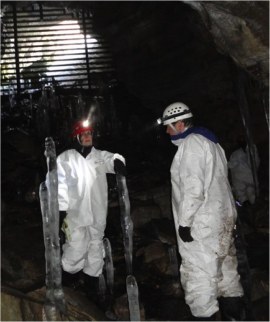
Photograph courtesy the author
Finally, the author we link out to with frequency (respectfully and affectionately noting her role in highlighting doom on the horizon), has offered a photo of herself in the setting of one of her stories. It is a cave with a story to tell, and while the story is not one we want to hear it is one we must ponder. That is why we keep linking out to her writing.
This is among her best short offerings, written originally to be a speech, with the creature below featured in compelling manner:

A Rabbs’ fringe-limbed tree frog. Photograph by Brian Gratwicke / Flickr
The Fate of Earth Humanity’s survival on this planet seems more uncertain than ever. But what happens when we look at ourselves through other creatures’ eyes?Share this:By Elizabeth Kolbert
Yesterday evening, at Manhattan’s New School, the New Yorker staff writer Elizabeth Kolbert delivered the second annual Jonathan Schell Memorial Lecture on the Fate of the Earth, an event established by the Nation Institute in honor of the late Jonathan Schell, a longtime New Yorker staff writer, and named for “The Fate of the Earth,” a series of articles that Schell wrote for the magazine in 1982 and later published as a book. Kolbert’s remarks have been edited for length.
When I was asked to deliver this lecture, the prompt I was given was to address the fate of Earth. At first, I thought of focussing on the threat of nuclear annihilation, which Jonathan Schell wrote about so urgently for The New Yorker in the nineteen-eighties, and which now, thanks to Donald Trump and Kim Jong Un, seems nearer than ever before. Another possible topic was, of course, climate change, which my colleague Bill McKibben spoke about here last year. Bill’s work, like Schell’s, possesses a fierce moral energy and a remarkable prescience. Whether it is hurricanes or droughts or flooding or wildfires, like the sort raging right now in Northern California, we’re already seeing the destabilizing effects of global warming that he foretold in “The End of Nature,” published in The New Yorker in 1989. Just this week, the administrator of the Environmental Protection Agency, Scott Pruitt, signed an order to initiate the repeal of the Clean Power Plan, which was central to the United States’ commitment to the Paris climate accord, which the White House has also decided to abrogate.
All of which is to say that October of 2017 is a scarily opportune moment to talk about nuclear war or to talk about climate change—or to talk about climate change and nuclear war. But I am going to try to do something different. Instead of looking at the fate of Earth from our anxious perspective, from a human perspective, I’d like to try to look at it from the viewpoint of the millions and millions of non-human species with which we share the planet. This represents a different kind of imaginative exercise. It requires us not to imagine events that might happen but to look at events that have happened through different eyes—or even without eyes, since so many of our fellow-creatures lack them. We will always fall short in these exercises, but I think it’s important to try, so I hope you will indulge me…





